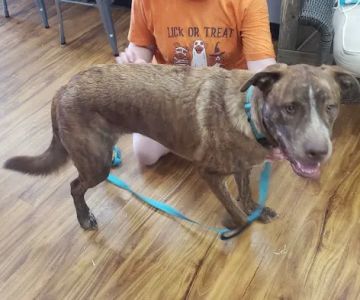Best Dog Food for Picky Eaters: Top Choices to Satisfy Your Dog's Taste
If you have a dog that turns its nose up at meal time or seems to have a never-ending list of "dislikes," you're not alone. As a dog owner, feeding a picky eater can be frustrating. After all, we want to provide the best for our dogs, but how do you handle a picky pup that refuses to eat what’s placed in front of them? Over the years, I’ve learned that the key to solving this dilemma lies in selecting the right dog food. In this guide, I will share the best dog food options for picky eaters and offer helpful tips to ensure your dog gets the nutrition they need, even if they’re a bit selective with their meals.

1730 Matthews Township Pkwy a1, Matthews, NC 28105, USA
See Details1. Understanding Why Dogs Are Picky Eaters
Before jumping into food choices, it’s essential to understand why some dogs are picky eaters. While it’s often just a personality trait, there can be several reasons behind this behavior. Some dogs are naturally more selective when it comes to food, while others may be dealing with health issues that make eating difficult. For example, a dog might refuse to eat due to dental pain, digestive problems, or stress. Understanding the root cause of your dog’s pickiness can help you choose the right solution.
It's also important to note that dogs may refuse food if they are bored with their diet or if they are overfed with treats. Sometimes, picky eating is simply a behavioral issue, so it’s crucial to stay patient and persistent in finding the right food that appeals to your dog's tastes.
2. The Role of Texture and Smell in Dog Food Preferences
Dogs, like humans, have individual preferences when it comes to taste, texture, and smell. Some dogs prefer wet food over dry kibble because of its stronger aroma and smoother texture. Others might prefer a crunchy kibble because it satisfies their chewing instincts.
When choosing food for a picky eater, consider the texture and smell. If your dog prefers moist food, look for canned food or fresh food options. On the other hand, if they enjoy the crunchiness of kibble, try offering high-quality, crunchy options that contain palatable ingredients.
3. Top Dog Food Choices for Picky Eaters
Now that we understand why some dogs are picky eaters, let’s dive into the best dog food options for finicky pups. Based on my research and recommendations from veterinarians, here are some of the top choices for picky eaters:
- Royal Canin Veterinary Diet Canine Gastrointestinal Low Fat: This formula is designed to be gentle on a dog’s stomach, making it a great choice for dogs that are picky eaters due to digestive issues. It offers high palatability, which can entice even the most selective dogs to eat.
- Hill’s Science Diet Adult Sensitive Stomach & Skin Chicken Recipe: This food is perfect for picky eaters with sensitive stomachs. It contains prebiotic fiber and is made with high-quality chicken, which makes it both nutritious and easy to digest for picky dogs.
- Wellness CORE Grain-Free, High-Protein, Turkey & Chicken Recipe: Wellness CORE is a high-protein, grain-free option that many picky dogs find irresistible. With its rich flavor, it appeals to dogs that enjoy protein-packed meals.
- Pedigree Chopped Ground Dinner with Chicken, Beef & Liver in Gravy: This canned food has a high moisture content and strong flavor that most dogs find appealing. It’s a great option for picky eaters who might prefer wet food over dry kibble.
- Natural Balance L.I.D. Limited Ingredient Diets Wet Dog Food: If your dog has allergies or sensitivities, this wet food option is perfect. It uses a limited number of ingredients to reduce the likelihood of food sensitivities, and its delicious taste encourages even the pickiest dogs to eat.
4. Tips to Encourage Your Picky Dog to Eat
Sometimes, it’s not just about the food itself, but also about how you present it to your dog. Here are some tips that I’ve found helpful in encouraging my picky eater to finish their meals:
- Consistency is Key: Dogs thrive on routine. Try to feed your dog at the same time each day to establish a consistent eating schedule. This can help them develop a routine and increase their appetite.
- Limit Table Scraps: Avoid giving your dog table scraps or too many treats, as this can spoil their appetite for their regular meals. Keep their food intake consistent with high-quality dog food.
- Warm Up Their Food: If you’re feeding wet food, try warming it slightly in the microwave (but make sure it’s not too hot). The smell of warm food can be more enticing to your dog.
- Try Mixing Wet and Dry Food: If your dog is picky about dry kibble, mix in some wet food or gravy. The added moisture and flavor can make the meal more appealing.
- Hand-Feeding: In some cases, hand-feeding your dog can stimulate their appetite. Try offering small portions by hand to see if they are more likely to eat.
5. The Importance of High-Quality Ingredients
When choosing food for a picky eater, it’s important to prioritize high-quality ingredients. Dogs with selective eating habits are more likely to enjoy food that contains high-quality, whole food ingredients like real meat, vegetables, and grains. Avoid foods with fillers, artificial preservatives, or low-quality proteins that could turn your dog off from their meals.
Look for dog foods that are formulated with real animal protein sources, such as chicken, turkey, or beef, as the first ingredient. These high-quality proteins are not only more palatable for picky eaters, but they also provide essential nutrients that support your dog’s overall health.
6. Consulting Your Veterinarian
If your dog’s picky eating persists, it might be a good idea to consult with a veterinarian. In some cases, picky eating may be a sign of an underlying health issue such as dental problems, gastrointestinal disorders, or food allergies. A vet can help rule out medical issues and recommend the best diet based on your dog’s unique needs.
Furthermore, your veterinarian can provide guidance on portion sizes, feeding schedules, and how to transition between foods if necessary. It’s always a good idea to involve your vet in your dog’s dietary decisions, especially if they are a picky eater.










